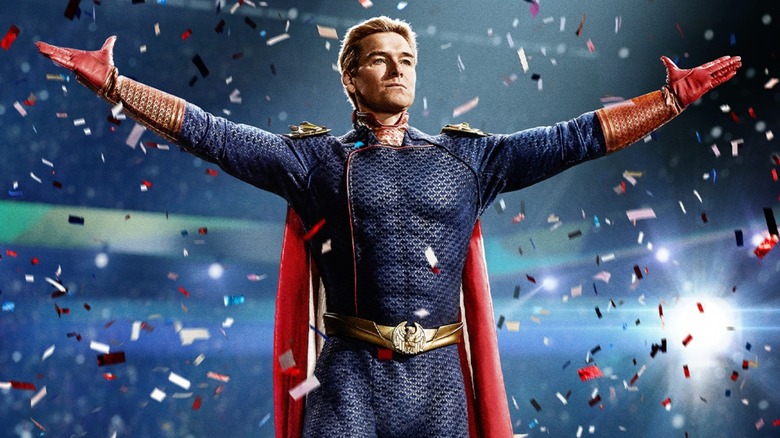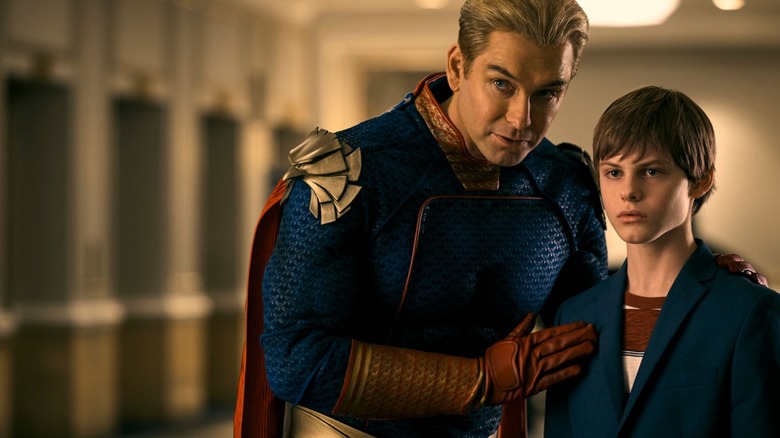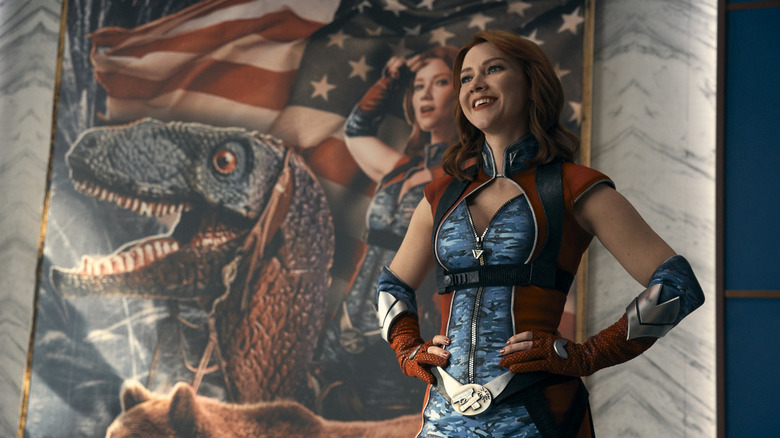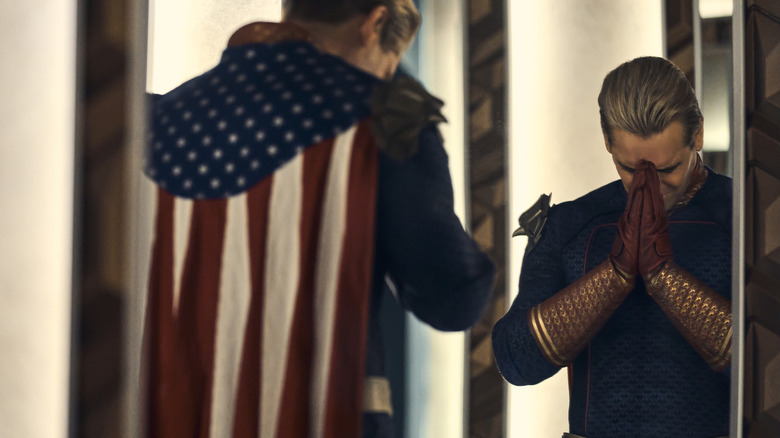The Boys Hits An All-Time Low On Rotten Tomatoes – But There's More To This Story Than Meets The Eye
Based on the 2006 comic book series by Garth Ennis and Darick Robertson, the hit TV series "The Boys" is a wicked, playfully mean-spirited satire of the highest order. It debuted in 2019, right when the Marvel Cinematic Universe was climaxing in popularity, and takes place in a universe where superheroes are real ... and are already deeply corrupted by their power. All heroes, presented as selfish egotistical celebrities, are overseen by a publicity firm called Vought International that wrangles their public image and raked in billions from merchandising.
The central figure of "The Boys" is the Superman-like character Homelander (Antony Starr), a villainous egotist who hates humanity and can barely contain his contempt as he treks out into the world to "do good deeds." Homelander does indeed kill bad guys and terrorists, but just as often cruelly murders or harms others to fit his own nefarious ends. He's abusive and evil. He's not a good guy. "The Boys" argues that superheroes and supervillains are more or less the same thing, and their only distinguishing features are their outfits and marketing teams.
The fourth season of "The Boys" debuted on June 13, 2024, and the reviews have been very positive. Based on 77 reviews, the new season has a 95% approval rating from critics on Rotten Tomatoes. Curiously, however, the Audience Score on Rotten Tomatoes — wherein non-professionals can give their own grade — is at a surprisingly low 51%.
While the low audience score denotes a definite "slowing" of the show's overall quality (/Film feels season 4 is aggressively miserable), the low audience score seems to be born of a curious, expanding catharsis from many of the show's fans. Some people, it seems, are just now figuring out that Homelander isn't a hero. They then "downvote" in response.
Wait ... Homelander is a bad guy?
As pointed out in /Film's recent interview with series creator Eric Kripke, there is a vocal and enthused segment of "The Boys" fans who haven't understood that it is a work of satire. Some have written (mostly on Reddit and in various fan forums) that "The Boys" is apolitical, and that it's not saying anything about the way "squeaky clean" conservative values frequently serve as a mask to cover deep moral rot. Those who see the show as apolitical are baffling to Kripke. As he put it:
"I just kind of throw up my hands, and I'm like, 'Well, I don't know what else to do then.' The show is many things. Subtle is not one of them. If you, for instance, think Homelander's a hero, I just don't know what to tell you. I don't know what to tell you. But look, on the other hand, if people want to watch this show as just escapist entertainment, like as any other superhero thing ... then I guess thanks for watching, question mark?"
As the show has progressed, Homelander has become increasingly terrible, and it's only with its fourth season that some viewers have begun to pick up on the show's (very obvious) political messaging. Many are realizing for the first time that they've accidentally been rooting for a villain this entire time. Upon having this realization, outraged fans are logging onto Rotten Tomatoes to register their outrage.
Some of the complaints are organic, with several viewers posting how the stories on "The Boys" have become too complicated, and that the writing is becoming too akin to an interpersonal soap opera. Others, however, merely seem mad at the show's politics.
The viewer response to The Boys
The new season features a group of conspiracy mongers that are very much meant to mirror QAnon, while a new character called Firecracker (Valorie Curry) is a near-fascist a-hole clearly modeled after certain figures one might see on Fox News. The Deep (Chace Crawford), meanwhile, learns the all-important lesson that "violence is power," perhaps echoing the ethos of a modern, over-moneyed police department or overfed military machine. Morals end when one has the supernatural ability to dominate. The series appears to be critical of demonstrative (but empty) American patriotism; do we only trust Captain America because he's wrapped in a certain nation's flag? As Kripke noted, it's not a subtle show.
Regardless, some viewers are only now taking exception. One viewer wrote that the new season is "Abysmal tripe created by nothing less than a bunch of leftist freaks. It astounds me." Another wrote, "Such garbage. Woke Hollywood writers have ruined another series that had potential," and a third argued, "The people making this show seemingly hate a large percentage of the viewing audience." One complaint was specific: "The mocking Christians at the end of season 4 did it for me. The show was great until then."
The bulk of negative comments, however, are one-sentence missives along the lines of "Worst season ever."
Such comments, however, might lead one to suspect that "The Boys" is getting review bombed; that is: many people are logging on, perhaps not even having seen "The Boys," to leave negative comments and artificially drive the Rotten Tomatoes audience score down. Once it is low, those same people can use the deflated number as hard evidence that broad audiences hate shows with anti-Right political messaging, and that professional critics are out of touch and shouldn't be trusted.
All art is political, The Boys included
Review bombing is common in the age of Rotten Tomatoes. It is essentially a meaningless smear campaign, enacted by trolls to send a Right-wing political message. It's also enacted by people who place far too much credence in Rotten Tomatoes scores. Recall that the approval ratings are submitted by critics or outlets as a "fresh/rotten" decision. If "The Boys" has a 95% approval rating from critics, it means that most professionals merely gave it a "pass." It doesn't mean that every critic gave it a 95 out of 100. Inflating or deflating those numbers doesn't prove what one suspects many of the ballot-box-stuffers seem to think it does.
Additionally, we should recall that all art is political. Every piece of media is a result of the society that produced it, and reflects a very particular viewpoint. If something appears to be "apolitical," it is merely reinforcing the status quo and arguing that everything is hunky-dory the way it is. Even writers and filmmakers can be unaware of the political underpinnings they may be inserting into their shows. They aren't sociologists; they merely have something to say, even if that thing is "everything is fine."
One might see written online that entertainment didn't used to be political and that it only became so in recent years. They then become nostalgic for the "early days," when they, as kids, could enjoy escapist entertainment without having to think about it. Art, however, has always been political. The nostalgia comes from a time when they themselves weren't political. When they weren't yet aware of the massages in their escapism.
The criticism of the fourth season of "The Boys" seems to be based in that very same nostalgia. They want to recall a time when they weren't aware.



